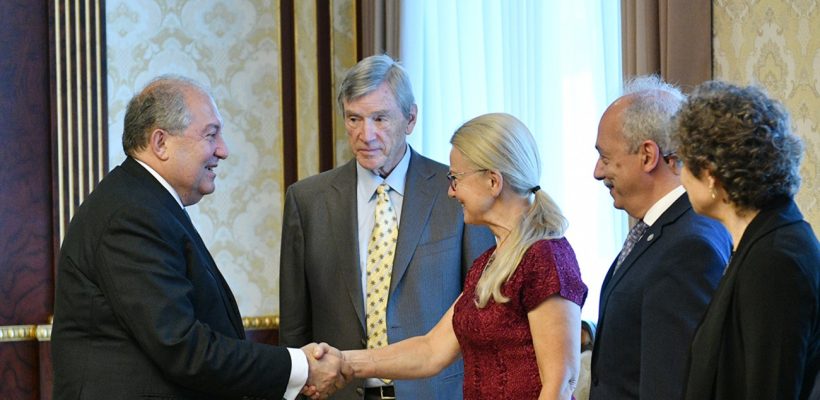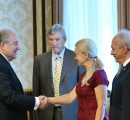
AUA & AGBU Research Group Conducts Technology Study
3 min readYEREVAN, Armenia – A comprehensive qualitative study was recently conducted to identify challenges and opportunities to support the rapid growth of Armenia’s technological ecosystem. The study was completed by a research group jointly initiated by the American University of Armenia (AUA) and the Armenian General Benevolent Union (AGBU). The study is titled Armenia’s Technological Future: Problems of the Development of the RA Technological Ecosystem and Opportunities and is an in-depth examination of the technological development of Armenia. This study is the first of its kind in Armenia where the group seeks to identify and recommend areas of activity and investment to accelerate the development of a sustainable technology industry in Armenia and guide the government and private sector to future action.
The concept of the study was introduced in October 2017 at the American University of Armenia Corporation’s (AUAC) meeting in Los Angeles in response to continuing questions and concerns about Armenia’s technological future. The AUAC Board of Trustees—with strong support from AGBU—committed to organizing an independent review of Armenia’s technological ecosystem.
The study was completed under the guidance of an international group of renowned scientists, policy experts, and entrepreneurs. During the course of the study, the team interviewed dozens of professionals and academics from diverse areas of the technology sector, including those involved in secondary education, higher education, science innovation laboratories and industry, and other institutional stakeholders. Researchers interviewed both middle- and executive-level individuals, policymakers, scientists, and field experts in an effort to have a representative and diverse collection of views.
Artur Khalatyan, lecturer at the AUA Akian College of Science and Engineering, serves as the executive director of the study. From April to September 2018, he interviewed some 60 individuals covering a broad spectrum of institutions, both private and public, spanning the technological ecosystem. The interviewees included representatives of government agencies and ministries with interest in technological development, secondary and higher educational institutions, scientific research institutes, and various industry leaders.
The project is unique not only in its methodological approach, but also for its output: the panelists are set to produce a list of attainable and scalable projects based on the findings from the research phase. These projects are expected to boost the development of the technological ecosystem through short- and long-term interventions, creating and repairing linkages among various stakeholders, as well as making changes to educational and other relevant policies. While AUA will initiate and lead some of the projects related to higher education, the group will also engage other partners who share the same vision and will commit to take on projects that will impact other parts of the technology ecosystem.
A statement from the panel expresses the shared view that Armenia’s technological development is first and foremost hampered by inadequate education, starting from the secondary school level: “AUA and AGBU believe that Armenia’s problems begin with inadequate resources for appropriate and quality STEM education in high schools (and even earlier), including insufficient teaching capacity and inadequate compensation for secondary education teachers … the problem needs to be addressed by the government at a national level. … Without increasing the number of well-educated high school graduates who are eager to enter technological work, Armenia cannot provide a sufficiently large technology workforce, and universities would not have enough undergraduate or graduate students to fill Armenia’s needs.”
More information on the projects stemming from this research will be forthcoming. These initiatives will seek collaboration and partnership from various stakeholders within the ecosystem.
Earlier in June the Panel convened a series of meetings in Yerevan with all stakeholders of the technological ecosystem, and met with Prime Minister Nikol Pashinyan and President of Armenia Armen Sarkissian. The prime minister expressed his appreciation of the panel’s efforts and emphasized that the development of a technology-based economy is one of his government’s top priorities. The president offered his office’s support for the upcoming efforts directed at the development of the technological ecosystem and called for the development of a single shared vision, which will direct the efforts of all parties.
Founded in 1991, the American University of Armenia (AUA) is a private, independent university located in Yerevan, Armenia, affiliated with the University of California and accredited by the WASC Senior College and University Commission in the United States. AUA provides local and international students with Western-style education through top-quality undergraduate, graduate, and certificate programs, promotes research and innovation, encourages civic engagement and community service, and fosters democratic values.
Media coverage:
[Armenpress] PM Pashinyan receives AUA and AGBU co-founded research group members
- PM Nikol Pashinyan met with AUA representatives.
- President Armen Sarkissian met with AUA representatives.


